Minerals and Mining
Compliance Solutions for the Minerals and Mining Industry
Benefit from a unified, data-driven approach to managing corporate compliance, ethics and third-party risk, trusted by leading minerals and mining companies.

Trusted by the world’s leading Minerals and Mining companies
Why leading minerals and mining companies rely on GAN Integrity
GAN Integrity is how compliance teams at minerals and mining companies get the tools and expertise to stay ahead of risk. With less effort and more reach, you finally get a better way to do your good work.
See everything – Gain a comprehensive view of overall risk and compliance across all your programs in one unified platform.
Adapt to anything – Leverage dynamic workflows and integrations to stay ahead of regulatory changes and evolving program requirements.
Get all the help you need – Receive dedicated support from GAN Integrity’s team of experts.
Compliance challenges for the minerals and mining industry

As a compliance professional in the minerals and mining industry, it often feels like you're fighting an unfair fight. You must navigate a complex web of regulations from agencies like OSHA, and numerous ESG laws such as the German Supply Chain Act (LKsG) and the EU Corporate Sustainability Due Diligence Directive (CSDDD).
The industry faces unique challenges, including environmental, bribery, and corruption risks, stringent health and safety standards, a transient workforce, and complex relationships with third parties and suppliers. You must also ensure your organization fosters an ethical culture and acts with integrity in all dealings with regulators, government officials, and communities.
Key areas of compliance in minerals and mining
Minerals and mining companies are complex enterprises. There’s many areas of compliance, ethics, and risk that need to be managed, spanning everything from Environmental, Social and Governance (ESG), to Conflict Minerals, to Anti-Bribery And Corruption (ABAC). These include:
- Supply Chain Due Diligence: Ensuring reliability, traceability, and compliance with laws such as the German Supply Chain Act, EU Corporate Sustainability laws, and the California Transparency in Supply Chain Act.
- Financial Reporting and Anti-Corruption Laws: Regulations such as the Dodd-Frank Act’s conflict minerals rule require companies to disclose payments made to governments and ensure their supply chains are free from corruption and human rights abuses.
- ABAC Compliance: Ensuring that anti-bribery and anti-corruption (ABAC) laws such as the FCPA and UK Bribery Act are upheld.
- Data Protection: Safeguarding sensitive information in an increasingly digital landscape and ensuring compliance with data privacy regulations, including GDPR.
- Environmental Impact: Ensuring minimal environmental disruption and complying with regulations on waste management, water usage, and land rehabilitation.
- Health and Safety Regulations: Occupational safety standards set by organizations like the Mine Safety and Health Administration (MSHA) require companies to implement safety measures and training programs to protect workers from occupational hazards.
- Labor Laws: Observing fair employment practices and labor standards, global modern slavery, and human rights legislation.
- Export Controls: Complying with international trade laws.
Steps to achieving compliance in the mineral and mining industry
Achieving compliance in any organization involves a series of strategic steps:
Compliance in the Mineral and Mining Industry
Risk Assessment
Identify potential compliance risks specific to your mining operations.
Objective Setting
Define clear compliance goals that align with your operational objectives.
Documentation
Maintain thorough records of compliance efforts and decisions.
Training
Educate employees about compliance requirements tailored to the mining industry.
Monitoring and Auditing
Regularly review compliance status and adjust practices as needed.
Reporting System
Establish clear channels for reporting issues and disclosures.
Issue Response
Quickly address non-compliance issues to prevent disruptions.
Continuous Improvement
Regularly update compliance practices to stay ahead of regulatory changes.
GAN Integrity for Mineral and Mining Companies
Our minerals & mining compliance software helps mineral and mining companies navigate these challenges with a comprehensive, easy-to-use compliance platform that organizes requirements, automates workflows, and provides powerful reporting, making it easier for you to do your good work. With GAN Integrity, compliance teams can see everything, adapt to anything, and get all the help they need.
ABAC Program Management
Ensure your organization upholds ethical integrity and ABAC compliance through comprehensive risk assessments, effective policy management, and continuous monitoring. Capabilities include:
- Third-party due diligence: Mitigate bribery and corruption risks with integrated questionnaires, sanctions checks, and risk intelligence data.
- Disclosure management: Consolidate and assess conflicts of interest (COI), gifts, travel, entertainment, and political and charitable contribution disclosures.
- Reporting and documentation: Maintain a complete audit trail and detailed reporting to easily demonstrate compliance to stakeholders and regulators.
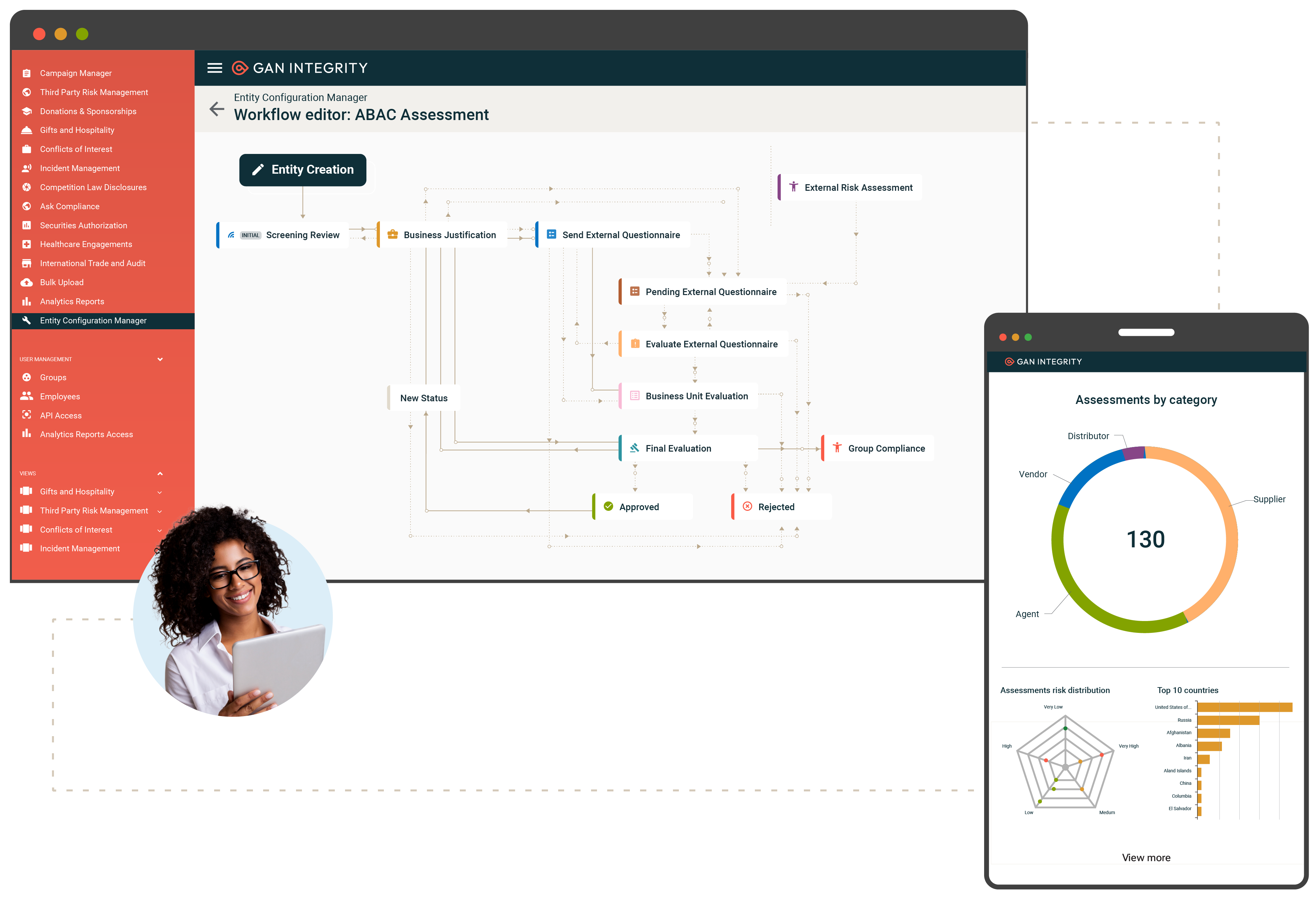
Conflict of Interests Management
Manage employee conflicts of interest disclosures with an easy to use, configurable platform. Capabilities include:
- Reporting and analytics: Role-based dashboards to identify areas of potential exposure with actions and remediation workflows to mitigate risks.
- Campaign management: Create conflicts of interest campaigns to inform and engage employees with training, policies and regular disclosure campaigns.
- Third-party risk integration: Track conflicts of interest disclosures against third parties and suppliers for a comprehensive view of risk.
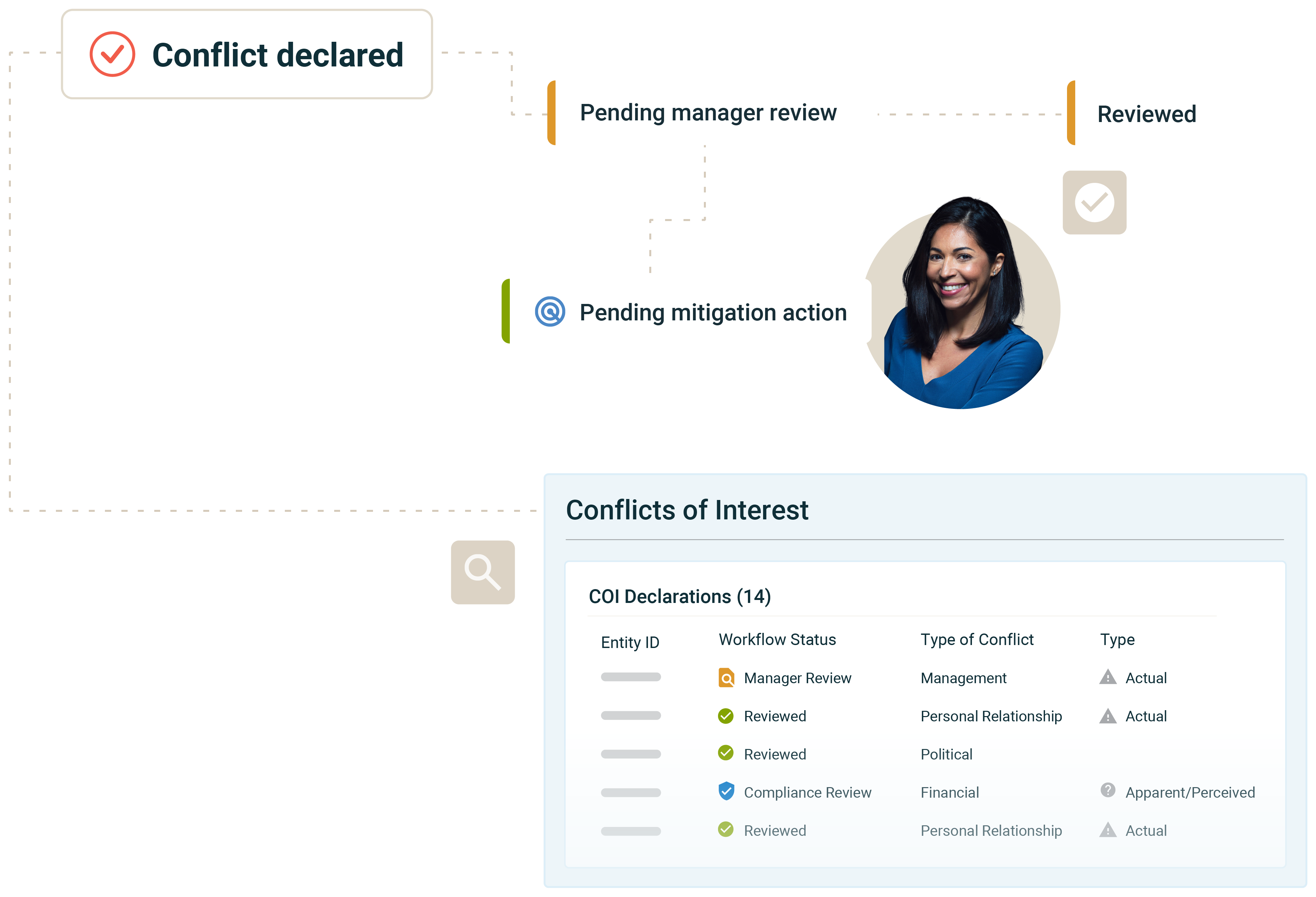
Supply Chain Due Diligence
Enhance supply chain risk management by consolidating processes, identifying and mitigating risks, and integrating data from various risk intelligence and business systems. Capabilities include:
- Automated risk assessments and continuous monitoring: Monitor suppliers continuously for adverse media, sanctions lists, PEP lists, forced labor, and ESG (Environmental, Social, and Governance) issues.
- High-risk supplier identification and management: Identify high-risk suppliers, manage them effectively, and track actions and mitigations to ensure compliance.
- Integrated due diligence assessments: Perform thorough due diligence across your business operations and workflows for seamless integration and enhanced efficiency.
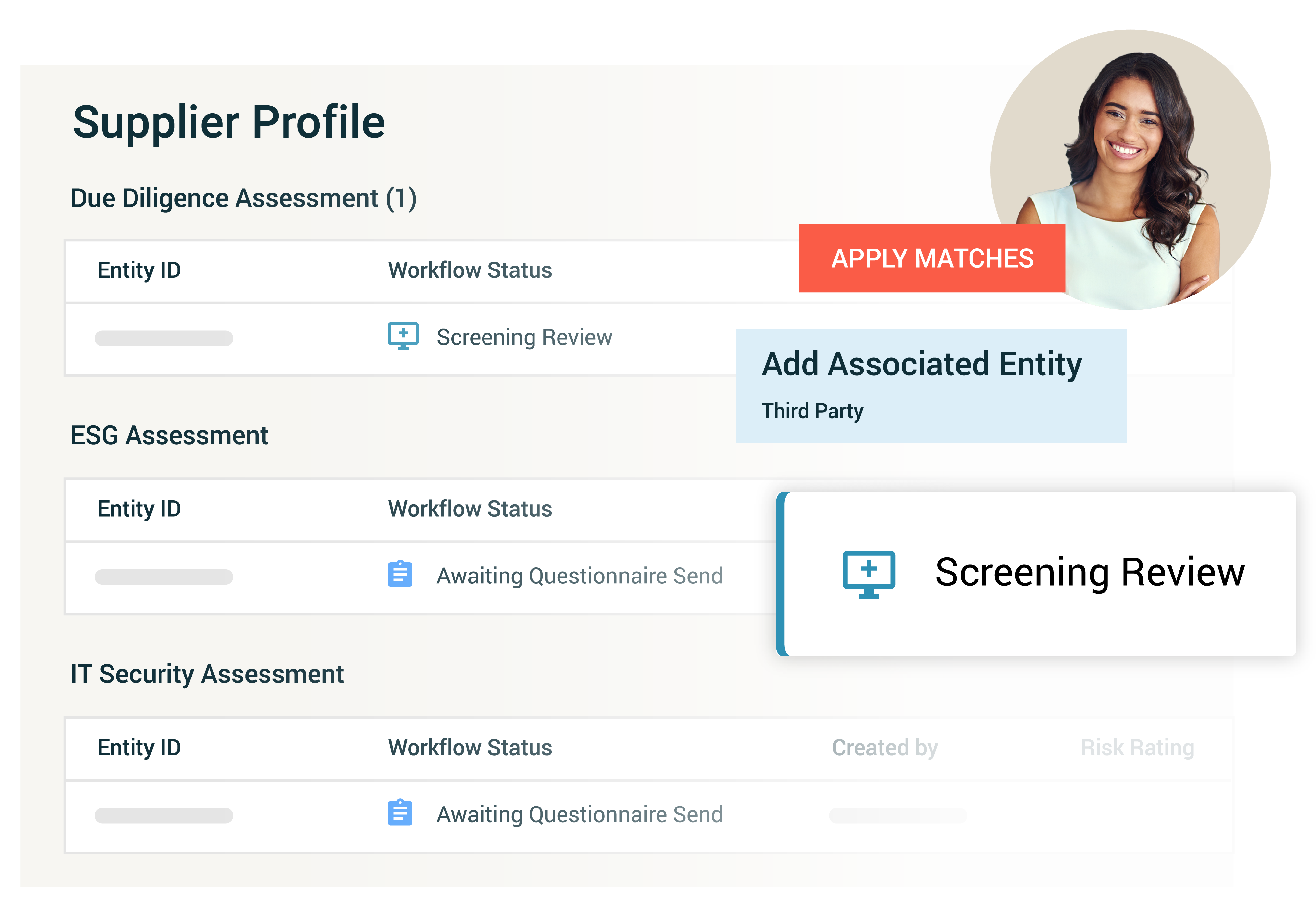
Disclosure Management
Consolidate your disclosures for conflicts of interest (COI), gifts, travel, entertainment, and political and charitable donations or contributions. Capabilities include:
- Policy management: Develop and enforce comprehensive disclosure policies. Educate and engage your workforce with targeted training and policy attestations.
- Flexible disclosure process: Simplify the submission of potential conflicts of interest with user-friendly forms, ensuring easy access for employees.
- Automated approvals and reviews: Enhance compliance with automated approval and review workflows. Quickly escalate notifications to relevant stakeholders to address potential risks.
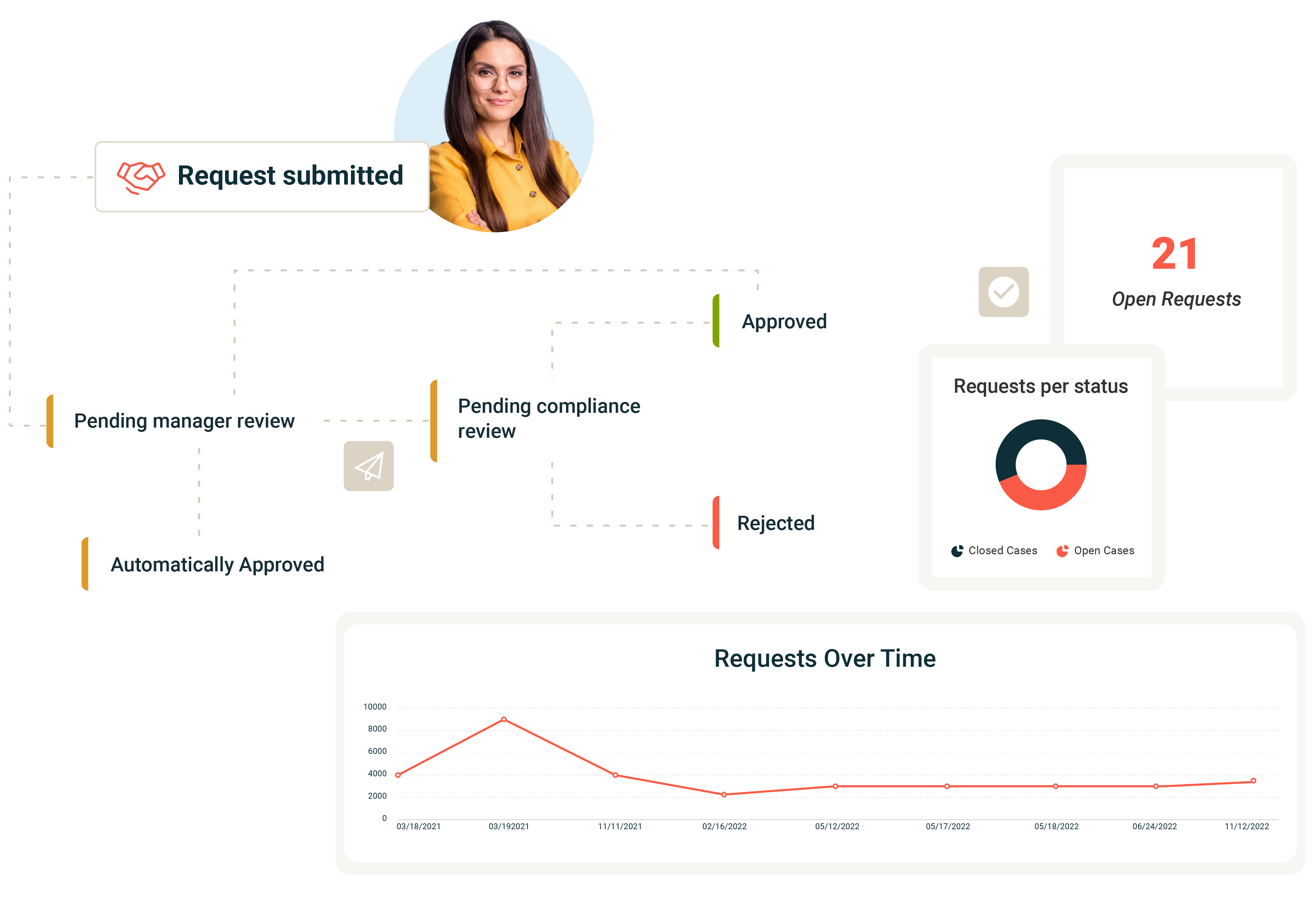
Reporting and Documentation
See everything across your compliance program, and generate reports and dashboards to demonstrate compliance program effectiveness to stakeholders and evidence to regulators. Capabilities include:
- Reporting and analytics: Executive, role-based dashboards to review the effectiveness of your compliance program initiatives.
- Evidence-based compliance: Maintain an auditable trail of all activity with the platform’s integrated and automated audit log.
- Compliance insights: See risk trends and patterns within your program, including third-party and supply chain risk, policies and disclosures.
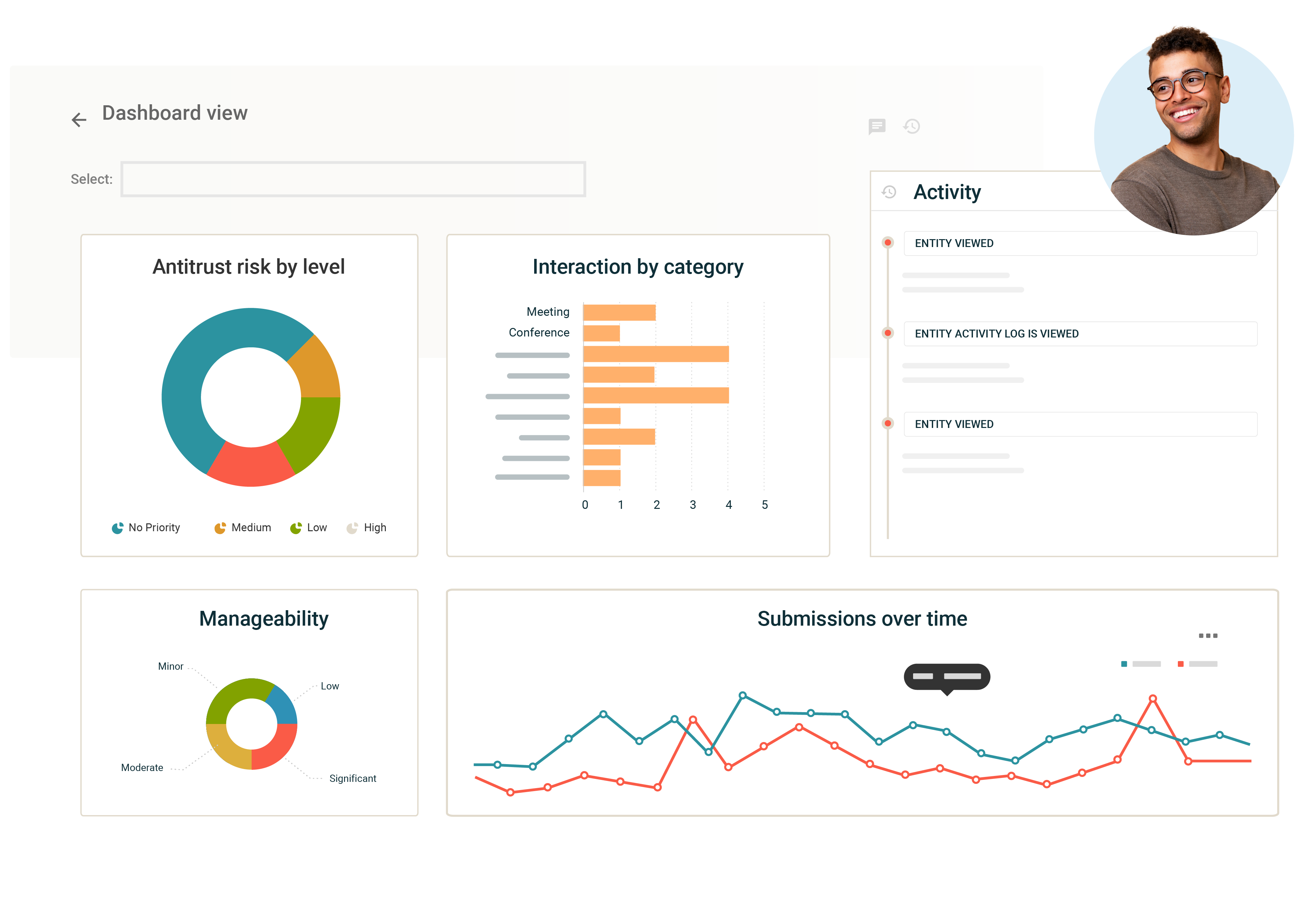
The GAN Integrity Platform means all your compliance and ethics programs can be managed in one place - now that's better.
What our Customers Say
GAN started out as only our high-risk transaction platform, then became our transaction, conflict and government interaction system. Now it’s just our Business Integrity platform.
Jessie O’Neil
Business Integrity Global lead, Barrick Gold
